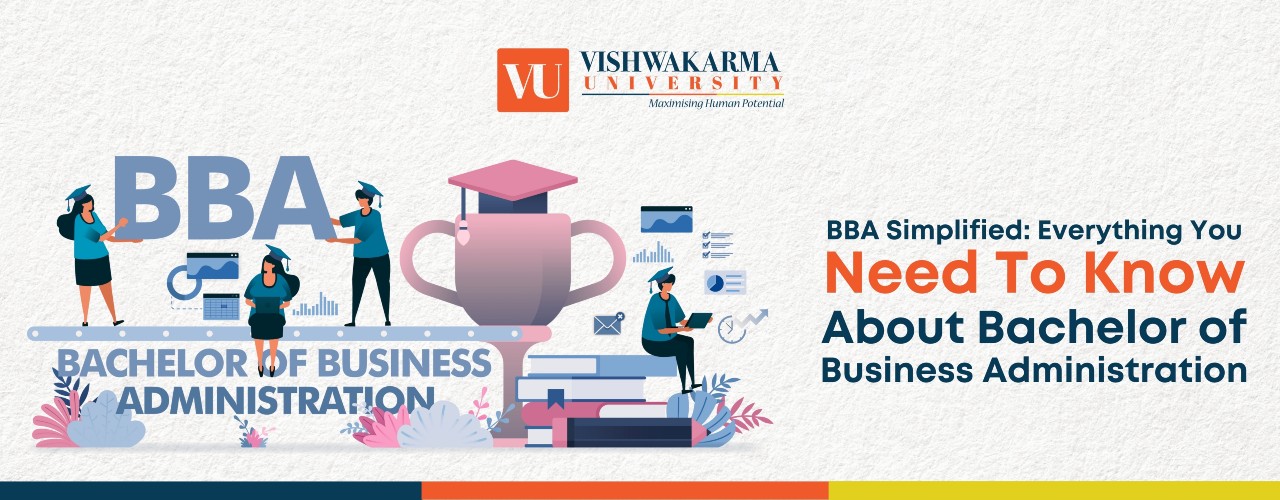Table of Contents
Introduction
- Brief Overview of BBA
- Importance of Choosing the Right Course
What is BBA?
- Full Form of BBA
- Understanding BBA
BBA Course Details
- BBA Course Duration
- Semester Structure
- BBA Course Subjects
- Eligibility for BBA Course
Why Choose BBA?
- Benefits of Pursuing BBA
- Career Opportunities After BBA
How to Pursue BBA After 12th
- Eligibility Criteria
- Admission Process
BBA Specializations
- Popular Specializations
- Choosing the Right Specialisation
BBA Course Fees
- Understanding Tuition Fees
- Scholarships and Financial Aid
Career Prospects After BBA
- Job Opportunities
- Industries Hiring BBA Graduates
- Salary Expectations
Higher Education Options
- Pursuing an MBA After BBA
- Other Postgraduate Programs
BBA vs. Other Courses
- Comparing BBA with B.Com and BMS
Top BBA Colleges in India
- Listing of Renowned Institutions
Frequently Asked Questions (FAQs)
- Detailed Answers to Common Queries
Conclusion
- Encouragement for Prospective BBA Students
- Recap of Key Takeaways
What is BBA?
Bachelor of Business Administration, also known as BBA, is a prestigious undergraduate program that offers students a holistic approach to various aspects of business management. It’s designed to provide students with a solid foundation in the basics of business. This makes it an excellent choice for students who are aspiring to enter the corporate world.
BBA Course Details
Duration
BBA is typically a three-year program that is divided down into six semesters. Each semester covers a set of core and elective subjects, which allows students to gain in-depth knowledge of different business disciplines.
BBA Course Subjects
The BBA course curriculum includes subjects like marketing, finance, economics, business law, organisation structures, and management, among others.
BBA Course Eligibility
Most universities require prospective students to have completed a 10+2 education with a minimum score. Some institutes also conduct entrance exams to evaluate students for admission into the BBA course.
Why Should You Choose BBA?
Pursuing a BBA degree offers many advantages:
- Broad Foundation: BBA provides a comprehensive foundation to understand business concepts, which is essential for future managers and entrepreneurs.
- Versatile Skills: BBA graduates develop a versatile skill set applicable to different industries, making them sought after talent by prospective employers.
- Career Opportunities: BBA degree holders enjoy a wide range of career opportunities in sectors like finance, marketing, human resources, and more.
- Entrepreneurship: The program equips students with the knowledge and skills required to start and manage a business.
How to Pursue BBA After 12th?
- Eligibility Criteria: To pursue BBA after 12th grade, candidates typically need to have completed their 10+2 education from a recognized board with a minimum aggregate score.
- Admission Process: Admissions are often based on entrance exams, followed by personal interviews. Some universities also consider academic performance in the admission process.
BBA Specializations
BBA offers an array of specialisations to cater to different career interests.
- Finance: BBA in Finance equips students with the skills needed to manage financial resources and make efficient investment decisions.
- Marketing: Marketing specialisations focus on strategies for promoting products and services effectively.
- Human Resources Management: HRM delves into managing human capital at an organisational level. You can find a future in the HR department of any corporation with this degree in hand.
- Entrepreneurship: This course will help you nurture aspiring entrepreneurs and impart knowledge about starting and managing businesses.
- International Business: This degree helps prepare students to work in a global marketplace, with international corporations and MNC’s.
- Supply Chain Management: Specialising in supply chain management teaches students the intricacies of managing the flow of goods and services.
BBA Course Fees
Tuition fees for BBA programs can vary vastly based on the institute and its location. It is essential to research and compare fees at different institutes to make an informed decision. A number of universities also offer students scholarship opportunities, financial aid and educational loans to support their education.
Career Prospects After BBA
Graduates from BBA programs have diverse career prospects:
- Job Opportunities: BBA students can work in various roles, including management, trainees, marketing executives, financial analysts, HR managers, and more.
- Industrial Hiring Practices: BBA graduates are sought after in industries like banking, finance, retail, IT, healthcare, and manufacturing.
- Salary Expectations: Salaries for BBA graduates are based on factors like experience, job role, and the employer. However, the norm is that BBA graduates often enjoy competitive starting salaries.
Higher Education Options After BBA
Many BBA graduates choose to pursue higher education to enhance their career prospects further. A popular choice is an MBA or a Master of Business Administration. Additionally there are other postgraduate programs in business and management available for those looking to specialise.
BBA vs Other Courses
When deciding on a course, it's essential to understand the differences between BBA and other undergraduate business programs. A common comparison is with Bachelor of Commerce (B.Com) and Bachelor of Management Studies (BMS). While these programs share some similarities, they also have distinct features that cater to various career aspirations.
Watch the video below to know more about the BBA course and why you should choose it.
Top BBA Courses in India
India boasts several renowned institutions known for their quality BBA programs. Some of the top colleges offering BBA courses include:
- Indian Institutes of Management (IIMs): IIM Indore, IIM Rohtak, and others offer BBA programs with a strong focus on management education.
- Symbiosis Centre for Management Studies (SCMS): SCMS is known for its holistic approach to business education.
- Christ University: Christ University in Bangalore is renowned for its BBA program, emphasising skill development and experiential learning.
- NMIMS Mumbai: NMIMS offers a BBA program that combines theoretical knowledge with practical exposure.
- Amity University: Amity is known for its global perspective and industry-oriented BBA courses.
- Vishwakarma University: Vishwakarma University is emerging as a prominent institution for BBA courses, offering a comprehensive curriculum and industry-relevant training.
These institutions are known for their quality education, experienced faculty, and strong industry connections.
Frequently Asked Questions (FAQs)
To provide you with a well rounded understanding of the BBA course, here are some frequently asked questions and their answers:
FAQ 1: What is the full form of BBA?
- Answer: The full form of BBA is "Bachelor of Business Administration." It is an undergraduate degree program designed to provide students with a comprehensive understanding of business principles, management practices, and essential skills required to excel in various business roles.
FAQ 2: Can I pursue a BBA course after 12th commerce?
- Answer: Yes, students who have completed their 12th-grade education with a background in commerce are eligible to pursue a BBA course. In fact, BBA is an excellent choice for commerce students as it aligns closely with their academic background and career aspirations.
FAQ 3: Are there job opportunities after completing BBA?
- Answer: Absolutely, completing a BBA course opens up a wide range of job opportunities in various sectors. BBA graduates are in demand in fields such as management, marketing, finance, human resources, and entrepreneurship. They can work as business analysts, marketing managers, financial analysts, human resources managers, or even pursue entrepreneurial ventures.
FAQ 4: Can I pursue an MBA after BBA?
- Answer: Yes, pursuing an MBA (Master of Business Administration) after completing a BBA is a common and highly recommended path for many students. An MBA program offers advanced knowledge and specialisation in various aspects of business, making it an ideal choice for career advancement. BBA graduates often seek an MBA to enhance their qualifications and career prospects further.
FAQ 5: Is BBA a good course for aspiring entrepreneurs?
- Answer: Yes, BBA is an excellent course for individuals aspiring to become entrepreneurs. The program provides valuable insights into various facets of business, including entrepreneurship. BBA courses often include subjects like entrepreneurship development, business planning, and innovation management, which equip students with the skills and knowledge needed to start and manage their businesses successfully. Many successful entrepreneurs hold BBA degrees, and the program can serve as a strong foundation for aspiring business owners.
Conclusion
As you embark on your BBA journey, keep in mind that this program not only equips you with essential business knowledge but also fosters critical thinking, problem-solving skills, and leadership abilities. It is a versatile degree that can open doors to a wide array of career paths, from finance and marketing to entrepreneurship and consulting.
Whether you aspire to be a corporate leader, an entrepreneur, or a specialist in a specific domain, a BBA degree provides a solid foundation upon which you can build your future success. The choice of specialisation, internships, and extracurricular activities during your BBA course can further enhance your skills and employability.




